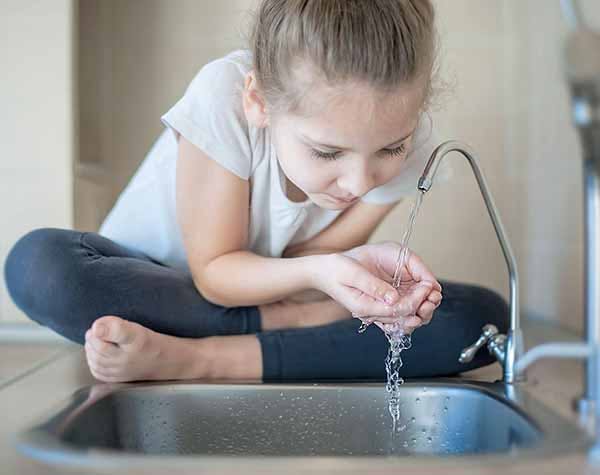May 2022
Hydration 101: How Much Water Should I Drink A Day?
Most of us are aware that we should be drinking plenty of water, but maybe you're a bit confused about how much "plenty" is. In fact, you may be asking yourself, "How much water should I drink a day?"
Some say eight 8-ounce glasses of water a day is just what the doctor ordered (and perhaps they did, back in the day). While it's not bad advice, it's also not necessarily true for every person. The amount of water you should drink in a day corresponds to your body weight and many other factors that are unique to your situation.
Most folks can stay sufficiently hydrated by drinking water, tea, and other beverages when they feel thirsty. However, some beverages, like alcohol or sugary drinks, can dehydrate you. Plain ol' H2O is usually your best bet when it comes to water and wellness.
Drinking enough water seems like such a simple thing, but most people don't do it. Some don't like the flavor of plain water, finding it too tasteless or boring. Others simply forget.
If you feel thirsty or headachy, among other symptoms that we'll touch on, you're probably not getting enough fluid intake.
On the other hand, can you consume too much water? In fact, you can, and we'll talk about that too.
So, How Much Water Should I Drink A Day?
There is no one-size-fits-all answer to how much water a person should drink each day. Factors include your gender, body weight, activity level, where you live, and your health.
There are some loose guidelines, keeping in mind the particulars mentioned above. For example, the U.S. National Academies of Sciences, Engineering, and Medicine says around 3.7 liters per day is a good target for men, and women should try to drink approximately 2.7 liters.
Still, others recommend that you drink about half your body weight in ounces of water, which may be more or less than the amount from the National Academies’ recommendation. So, for example, if you weigh 150 pounds, you'll want to consume 75 ounces of water per day. That's 2.22 liters of water. Since a liter of water is 32 ounces, you can measure your intake by counting the bottles of water you drink each day, depending on the size of your water bottle.
Some resources on the web can help you calculate how much water your body needs.
You can also get fluids through healthy eating. For example, suppose your diet consists of a healthy amount of fresh fruits and veggies that contain high water content — cucumbers, bell peppers, tomatoes, spinach, and watermelon are a few good ones. In that case, your food can also go a long way toward keeping your body hydrated.
Why Is Water Intake So Important?
Your overall health depends on your body getting enough water.
There are numerous health benefits to sufficient hydration. Water lubricates your joints and helps prevent constipation, dehydration, and serious health issues like kidney stones, slower metabolism, weight gain, or risk of stroke. Likewise, it helps with electrolyte balance, healthy skin, body temperature regulation, and body detoxification.
Also, did you know your brain is about 80% water? So drinking plenty of water every day keeps your brain in optimal condition, which can positively impact your mood, focus, energy, decision-making, and more. Getting plenty of fluids can also help with memory function.
How Do I Know If I'm Not Drinking Enough Water?

There are several signs of dehydration that will alert you that your water intake is insufficient. The following is a shortlist of a few of the most common symptoms of dehydration.
You've Got Cotton Mouth and Desert Eyes
If you're experiencing a dry mouth, skin, and eyes, it could be an indicator that you're not getting enough fluids in your diet. Of course, some medications can cause these symptoms, and allergies can do the same. Still, adding plenty of liquid to your diet can help.
Your Head Aches
Have you ever found yourself enjoying a hot summer afternoon, only to suddenly come down with a pounding headache? You were probably having so much fun you forgot to hydrate!
Hot weather, too much sun, excessive sweating, vomiting, and diarrhea, among other things, can dehydrate you quickly, causing you to get a headache.
Your Urine Is Not a Mellow Yellow
If your urine is coming out dark yellow, it's a good sign that you're not meeting your water needs. On the other hand, light yellow or nearly clear urine is a good indicator that your hydration is sufficient. So increase your water consumption, and things should lighten up. If you don't see an improvement, you should see a doctor because dark urine may indicate a more severe condition that should be attended to.
You Can't Put Down the Salt
If you find yourself craving salty chips, fries, nuts, or other foods with a lot of sodium, you may need more liquids.
Amanda A. Kostro Miller, a registered dietitian, says, "Salt and salty foods stimulate thirst, so if you're craving something salty, your body may actually be begging for some water."
However, overdoing it on the water may cause your electrolyte levels to get wonky and make sodium levels plummet, as well. As with everything, balance is key.
There's No Sweat
Physical activity — such as a good workout, dancing, running, or just your garden-variety hard physical labor — should make you sweat. If you're not sweating, you probably need to increase your water consumption.
Sports drinks usually contain electrolytes that can help reintroduce fluids into your system and, at the same time, replace low sodium and electrolyte levels.
You're Breastfeeding, and Baby Isn't Satisfied
If you're breastfeeding, you are hydrating for two. Since breast milk is about 90% water, drinking enough fluids will help you with breast milk production. Research does tell us that nursing parents probably only need to consume enough liquids to satisfy their thirst, keeping in mind that we can get some of our hydration needs from water-dense fruits and veggies. Still, some experts recommend that you drink about 128 ounces of water each day in addition to those juicy fruits and vegetables.
Does Drinking Water Help With Weight Loss?
We love delivering this kind of news: It can!
Studies have shown that drinking water before consuming a meal can reduce your calorie intake. That's because after drinking a glass of water, you begin your meal feeling a bit full, and water doesn't contain any calories.
Likewise, we often confuse thirst with hunger pangs. If you're feeling hungry a few hours after dinner, try skipping the midnight snack and go for a tall glass of cold water. As well as helping you feel full, the cold water will speed up your resting energy expenditure because your body burns calories trying to warm the water to your body's temperature. Studies show that your resting energy expenditure can increase by as much as 24%-30% for an hour after drinking that cold glass of water.
If you're doing intermittent fasting, drinking water — and plenty of it — before your first meal of the day will help you avoid feeling hungry and keep you energized enough to focus on work if needed.
Can I Drink Too Much Water?
Drinking too much water isn't usually an issue for healthy people. However, perhaps surprisingly, it is possible to drink too much water. If you have a medical condition that causes your body to retain water or lowers your ability to excrete fluids from your body, drinking too much of the good stuff can cause problems.
Overhydration is when an excess amount of water is in the body. But drinking too much water rarely causes overhydration because healthy kidneys efficiently excrete excess water.
Should My Drinking Water Be Filtered?

Whether or not your drinking water should be filtered depends on a few different factors.
If you live in an area where your tap water is unsafe to drink, you may want to drink bottled water (which can be expensive) or consider installing a water filtration system in your home.
The naked eye cannot detect contaminated water. Likewise, microscopic impurities like bacteria, sediment, metals, viruses, and parasites that can make you sick can't be seen, smelled, or tasted.
If you have a health condition, your doctor may give you some medical advice about the kind of drinking water you should, or shouldn't, consume.
For example, those with high blood pressure or a heart condition may be advised to avoid drinking soft water, as it tends to have more sodium. Still, you can rectify this issue by using a potassium-based water softener if you want soft water for your skin, hair, laundry, and plumbing; hard water contains minerals and sediments that may be hard (if you'll pardon the pun) on those things.
How Do I Calculate My Water Intake?
You may be eager to increase the amount of water you drink, but find that it's a struggle to monitor your intake.
Here are a few ideas to help you drink more water and get the hydration your body needs:
- Keep a large 18-ounce or 32-ounce thermal water bottle by your side and refill it with cool fresh water throughout the day. Why cool and fresh? Because if it's pleasant to drink, you may be more likely to do it. Also, as mentioned, cold water has weight loss benefits!
- Track the number of times you're finishing and refilling your water bottle. If you're struggling to keep track of exactly how many bottles of water you’re drinking, try placing rubber bands around the bottle. Remove one band each time you empty and refill.
- Use an app for tracking your water consumption.
- Opt for water to accompany your meals or quench your thirst when you might otherwise choose soda or other sugary drinks.
How Much Water Is Enough Water for Good Health?
Getting plenty of fluids into your body is essential for optimal health.
There are plenty of ways to get extra water into the human body to avoid dehydration or life-threatening health conditions.
To know how much water intake is enough for you, you'll need to take a number of factors into consideration, starting with your gender, weight, activity levels, overall health, and living situation.
Do you need a lot of water? Maybe. But maybe not. Just quenching your thirst may get the job done. The amount of water you need to drink really all depends on your unique situation, your dietary habits, and more.
If you're still wondering or concerned about getting enough water into your system, try talking to a nutritionist, health coach, or your doctor.
Having a great water filtration system in your home, either at point of use or a whole-house system, makes it so much easier to stay hydrated. Wondering about your options? Reach out today.
Brought to you by homewater.com
All images licensed from Adobe Stock.
Featured Image